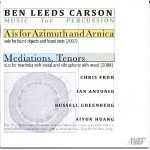NaBloPoMo Day 12!
When I was a fresh-faced, eager young grad student in the first term of my Ph.D. composition program, I took a seminar in the Critical Studies division of my university’s music department. (That’s an updated term for an updated type of musicology, btw.) Even though I wasn’t a musicologist myself, I always believed in being well-rounded and intellectually stimulated. Besides, the seminar topic concerned drawing connections between critical theory and one’s own creative identity, so it seemed to have a practically applicable side for a composer. The reading was tough — I was not accustomed to the writing style prevalent in the field of critical theory — but I knew that the professor was brilliant, not to mention my fellow students, and I enthusiastically looked forward to learning from them.
Sadly, a rather toxic dynamic developed around the seminar table. Many of the students were already fairly widely-read in the discipline — great, right? maybe they could decipher some of those paragraph-long, syllable-larded sentences that worked so well at curing insomnia in us newbies — the problem was, they weren’t interested so much in illuminating the material itself as they were in making it crystal clear at every class meeting that they knew much more about it than you did. Yes, you. And you, and you, and you over there, too. And woe unto any of you should your opinion differ from that of these budding schoolyard bullies scholars. Some of the lowest points in the course occurred when the critical theory component of the course topic (relatively objective) got its signals crossed with the creative identity part (relatively subjective), resulting in fruitless, apples-to-giraffes pseudo-debates. Only marginally better were moments when the more subjectively-inclined among us shared some meaningful experience formative to our creative identities, to which the response was a resounding
*crickets*
So I’m sorry to say that I didn’t learn a whole lot in the course; it’s awfully difficult to learn anything new when so much of your mental energy is devoted to maintaining the illusion that you already know everything. A friend and I instituted a ritual of repairing to a café after each class meeting to process, vent and detox from the latest dysfunctional spectacle, while during the class meetings themselves, we sat in the back snickering and throwing spitballs (well, not really, but we wanted to SO BAD!
😛 ).
A few more incidents from the Academic Discourse Hall of Shame:
- During a discussion of the influence of jazz on film music in a film-scoring class, I watched 2 students bicker (for a minute or two but it felt like an eternity) over the exact release date of Miles Davis‘ seminal record Birth of the Cool — this was in the days before most anyone in the room could have looked up the date by accessing the internet with their cell phone. At the time, I was too shy to say, “Why don’t you take it outside, guys?” so I just sat by rolling my eyes so hard I nearly hurt myself. (For those of you keeping score at home, the release date is June 1950. Don’t say you didn’t learn anything here today! :P)
- Early in the term during a music history seminar, my fellow students and I took turns presenting ideas-in-progress for research topics. I talked about my interest in settings of the Requiem Mass, particularly the Dies Irae section, and I expressed curiosity about whether the religious beliefs (or lack thereof) of various Requiem composers influenced how they set the text. LORD AND HOWDY, my classmates reacted as if I had set up a revival tent and forced them into it with a cattle prod! One smart fella in particular took me to task for failing to apply the Scientific Method to my analysis of the music. At the next class meeting, another joker said, “Here, I thought you’d like this,” and presented me with a religious tract
- I had a solo cello piece performed on a student concert, and a fellow grad student (and friend, let me just say) explained to me in a sincere, concerned voice that my piece did not contain its own internal critique. That was the first I’d heard that internal critique was something to aspire to; it comes quite naturally to me in life, but one of the reasons I love composing is that, if I’m doing it right, it gives me a welcome vacation from that whole scene. Intra-musical critique? Thanks, but no thanks. I mean, it’s the sort of thing that can be effective if it arises naturally and isn’t taken too seriously. Nothing wrong with poking fun at oneself. But to earnestly seek it out like some sort of musical mortification of the flesh? Come on, the pay already sucks as it is, let’s not rub it in!
That reminds me: My composition professor Jorge Liderman once said, “You don’t have to put blood into every note.” Words to live by, I believe!
Anyway… what’s my point here, other than sour grapes, you might ask?
Well, as I said the other day, the theme I see running through this is a need to be right, made corrosive by a corresponding need for others to be wrong. This may be a bit of behavioral residue left over from the times when being wrong meant getting eaten by saber-tooth tigers. Here’s a revolutionary idea, though: what if you could just be right, without the sharp, delicious chiaroscuro contrast of those around you being wrong? What if everyone could just do their own thing and have it be okay? Yeah, you can say I’m a dreamer. But I don’t think I’m the only one. We humans, funny and sad as we are, go around acting like life is a zero sum game. Who says? What if there doesn’t have to be one loser for every winner? Like the song says, “I want a name when I lose.”
Hey, it used to be that name was “Nerd.” Look how far we’ve advanced already!

If you enjoyed this post, would you consider…
Thanks — you make the world a better place! 🙂



I was in the PhD comp program for a semester. I couldn’t take the other students. They seemed to have been around for years and years…7 or 8 for most of them. There was nothing friendly or nurturing about any of them. Their greatest disdain was for one of their former number who had the audacity to finish, graduate, teach and gain grants and commissions. They said it like it meant killing puppies. They may still have been there when you were there. Toxic is a good word.